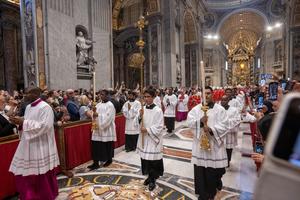We Are One in Christ — Seeing Through Another’s Eyes
An empathetic openness to others’ experience ought to confirm our own experience of the truth

There are a number of levels at which the experience of an 80-year-old woman cannot be mine. For one thing, I’m a man; and I’m in my 20s. Yet seeing the world through another’s eyes to the extent possible is highly enriching. Whether the difference is one of age, sex, race or religion, vicarious experience is personally hard, learning that all it takes to be a good mother is goodness.
When it comes to experiencing the life of someone separated by state of life, gender and age, the insights of a different experience can be cataloged in and enrich one’s own experience reality — even if they will never be quite the same as one’s own. When Madeline Fry Schultz acknowledged that the “lows are low” when it comes to post-partum motherhood, she could also, in the light of her own experience, assert that “the highs are so, so high” and that mental and physical suffering is “only half of the story.”
Since Rebekah Curtis can draw on decades of experience to tell me that family life is “an icon of the Lord’s emptying of himself on our behalf,” I am more likely to believe her. Eight children later, she tells me that being a parent “is hard” but full of a joy that is “primarily eschatological.” All right, I’ve filed that away — and my idea of family life, the pain and joy a woman experiences in motherhood, as well as (at least a little) intellectual preparedness for possibly being a parent one myself day is that much more refined.
Anna Rist does the same thing for me in Untimely Lightnings. Through her verse, I can glimpse the world of an 80-something woman of Jewish descent whose children are in their 50s. As Rist ages, she “can be / that person who underneath always was me.” This leads her to meditation on the final end of man:
And so life has passed, until sudden one’s eighty
and life-and-death questions begin to loom weighty
Her rock-bottom realization that she seems to exist through no choice of her own and all she “can decide: / is either to keep going or commit suicide” frees her from “fuddy hats” and the “national cult of shopping” and the dissatisfaction of “a face-lift.”
The theme of children and siblings runs throughout the book. “Yet through all years / between and on / my to eternity babe” she croons to one “fifty / yet still babe” to her. If sons “flit in and out” of her life (unlike daughters), nevertheless the “precious lending / from now and to world ending” which is family life and parenthood will end in a “shared consolation.”
The life signified by the “ring / bride vow sealing” is one of “traveling travailing / home-building willing / fill my pilgrim role.” This willing home-building and travailing participates in the “life offered in the chalice / on the paten” unlike the “desperate lottery” “wan mothers ply,” wondering whom “to carry, suckle, whom / scalpel, suction, stab within the womb.” Her family and religion are obviously closest to and constantly in her heart. “Four live births” follow two miscarriages she tells us in a poem entitled “For the Record,” asking that her mistakes and failures in motherhood “will / a little leniency receive” from children “Peter Alice Tom Rebecca.”
I let Rist’s mist-like memories of World War II waft around my head: she was “born into a world preparing / renewal of war” and struggles with the fact that her father was “Shoah-barred from baptismal laving.” She takes “unexploded munitions” “for granted, just the way things were” and remembers old friends, deaths and childhood experiences, sometimes struggling with a tension between Jewish and Christian influences.
While the verses cover numerous topics, the poems that struck me most from Rist — like the articles of Curtis and Fry Schultz — were the ones in which I could glimpse the mentality of an older woman toward her children. The vicarious experience brought to us by authors such as these should be cherished because it enables us to appropriate something of the wisdom others have acquired through their own lives, often very different from ours.
The lack of mentorship for young men and women has been deplored many times in our own day. One place to start answering the question of how to prepare for the “prime time” for marriage is to seek the wisdom available to us through the writings of those who have gone before us — some “marked with the sign of faith,” others still living and bearing their crosses.
Ultimately, though, an empathetic openness to others’ experience ought to confirm our own experience of the truth. It verifies that in the “following” of Christ is “a daily setting out,” regardless of whether we are old or young, male or female: “There is neither Jew nor Greek: there is neither bond nor free: there is neither male nor female. For you are all one in Christ Jesus” (Galatians 3:28).
















